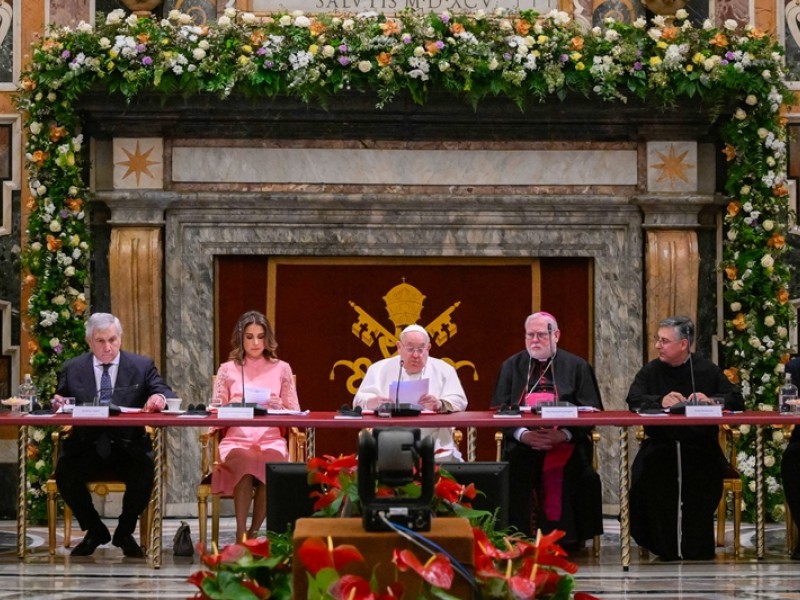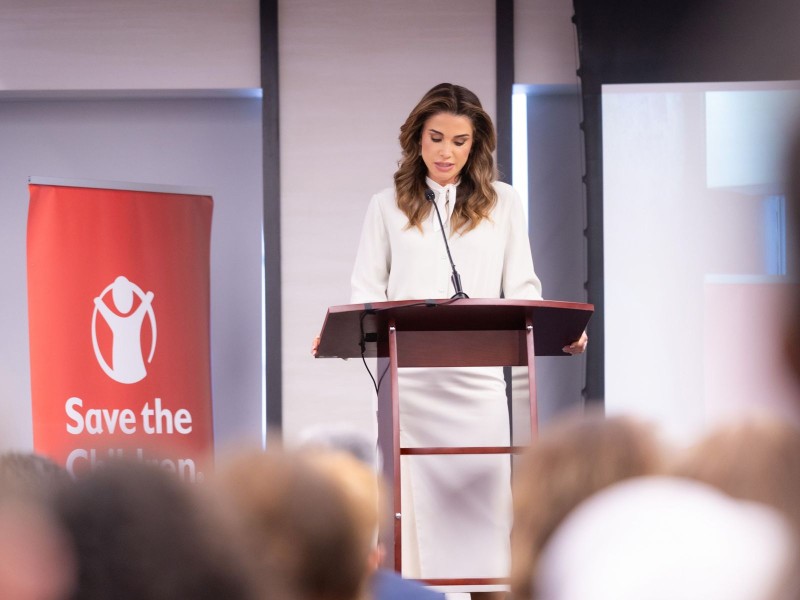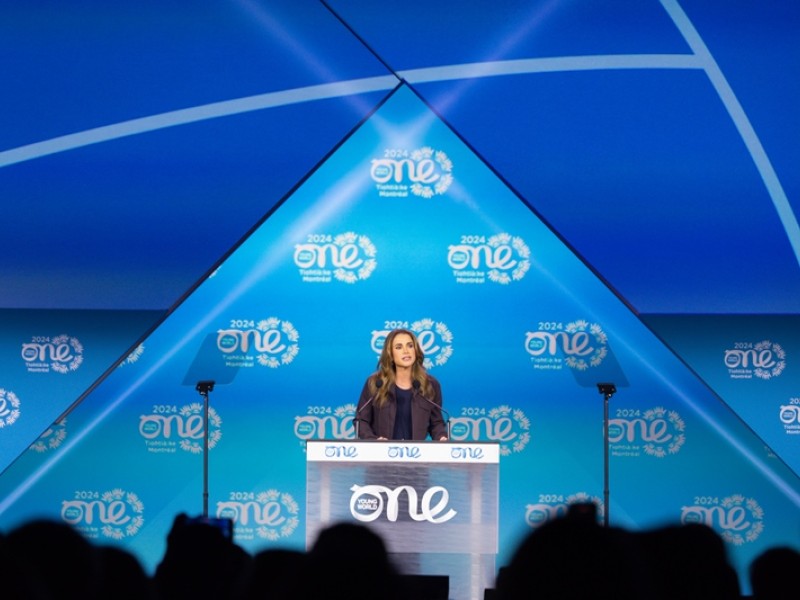Queen Rania’s Speech at the Women in Business in the Arab World Conference 2002 - London, UK
Thank you, Madam Chair, for your very generous introduction. And let me also thank Ahmed Suleiman, for his kind invitation to join you today...and to thank all of you, whose time and talents have made this conference happen. I am honored to have an opportunity to be part of what has become an admired and influential event.
I look around this room, and I see stars – an extraordinary constellation of delegates: women representing critical business sectors and virtually every part of the Arab World. It is you who empower our communities and nations, through your professional and public work. It is you who re-envision and re-shape the future, through practical and concrete leadership across the spectrum of business and society.
Stars shed light: they help us see the world in a new and clearer way. Stars radiate energy, enabling lives around them to flourish and grow. And stars form constellations: transforming individual points of light into patterns of inspiration; helping us look up and find our direction.
Today, Christine [McCafferty] has challenged us to look to the future. And it doesn’t take a telescope to see a future of tremendous potential. Global enterprise promises to carry the fruits of new technology and innovation to developing and developed nations alike. With modern communications and growing knowledge, we can work together to solve problems... societal, health, environmental, and others...faster and more effectively than ever in history.
But it is just as clear that this promise can only be met when people truly connect. The fact is, ours is not an age of “globalizers” and “globalized” – two separate camps, the active doers and the passive done-upon. On the contrary. In an era, like this one, of worldwide interconnections, lasting success for any demands active participation by all. There are no silent partners in earth’s future. We are all managing directors with a claim on the equity.
That means coming together to create new patterns of understanding, new constellations of mutual respect. Nowhere is this more important than between the two great regions represented here, the Arab World and the West. Today, the future we build together will have an impact, in our countries and around the globe. And this year, we have a chance to shape that future as never before.
We can build bridges of understanding that open the way to prosperity and hope for all our peoples. Or we can look away as others sow ignorance and terror. We can work together to help bring justice and security to the people of the Middle East. Or we can let the conflict consume another generation.
I believe that we have the power to achieve peace and justice. But I believe one thing is clear: the West and the Arab World must work together. We simply cannot afford to let anyone divide our peoples into “us” and “them.” We cannot afford, on either side, to settle for stereotypes and simplistic images.
Meetings like these help build the honest and open dialogue that can help people get past the headlines to the truth…counter misunderstandings...and promote the tolerance we need for all of us to move forward. Those who have lived, studied, traveled, or worked in another society are uniquely able to bear witness to its true character and complexity, and we all have a responsibility to do so.
But talk is not enough. We must also show the world, through our actions and reactions, what we value, believe in, and hope. In this deeper dialogue, the delegates to this conference speak volumes to the world.
First, is a message about who Arab women are. Diverse. Creative. Achieving. Worthy. Arab women do not have one style of dress – or one style of thinking. What we do have in common is a huge contribution to society – through our professional lives, through our families, through our strong values.
Second, is a message about what Arab women can be. Today, throughout the Arab World – indeed, throughout the whole world – more and more Arab women are in leadership positions. There are Arab women CEOs, women officials, women professors, and women engineers. Arab women have founded and managed literally countless NGOs that have changed lives, minds, and policy – not only to help women, but to benefit children, the family, and society at large. And Arab women are on the cutting edge of new thinking in areas such as global finance and technology.
The skill and success women bring to these roles and others are matters to be proud of. Quite frankly, they also show us how much more we could achieve, as societies, if every door were open. Gender inequality is a challenge we share, of course, with women across the globe. The plain and simple fact is that humanity will fulfill its maximum potential when all people are empowered to fulfill their potential. This means respecting and really communicating women’s rights.
I spoke earlier about the need for bridges of understanding between the West and the Arab World. We must also build bridges within our societies, bridges that help us reach new understanding. We must change the mindsets, among men and women, that limit women’s dreams and possibilities… just as we must change the mindsets that limit the horizons for communities and nations.
Usually, when we talk about empowering women, we talk about improving women’s education. Certainly, education is key to giving women access to opportunity and control of their lives. In fact, Arab countries are making more progress in this area than they are frequently credited. The dropout rates for girls across the Arab World are significantly lower than they are for boys. Almost half of the children in primary school are girls, and even more that percentage actually rises at the secondary level. Improvement is also being seen in higher education. More than 40% of those enrolled in universities in the Arab states are women.
This is progress we must build on – and not simply because of what it offers women. Abundant research points to the positive relationship between the education of women, on the one hand, and social welfare, especially children’s health and achievement, on the other. It can be said in four short words: Empowered women empower society.
But to really empower women, education must be accompanied by belief in ourselves. For that, our girls need stars – women they can admire and emulate. Our girls – and our boys, too, for that matter – need to see women who are honored for all they contribute. They need to see that we don’t abandon our values and culture when we respect other people and other cultures. They need to see that esteeming one’s heritage, and taking charge of one’s life, are not in conflict – indeed, I believe that in our heritage, they go hand in hand.
The brightest stars shed the most light. And Arab women have great light to offer: international and cross-cultural experience, strategic insight, management expertise, technological know-how, great scholarship, profound art, deep faith. It is your full humanity that allows each of you, in your own way, to show our young people how to shine. I believe that it also puts you in a leadership position when it comes to the future. The fact is, that women’s opportunities are still in their infancy in most countries of the world. Your knowledge and ideas can inspire new and better solutions to shared problems – from balancing life and work, to building healthy families, to equitable economic development.
Great stars also blaze with energy – internal fire, that is multiplied when women work together. That is how great constellations like this conference empower change – creating synergies that overcome barriers, create new opportunities, and show other women the way.
On behalf of so many women who have been helped by stars like you, let me thank you for shining so brightly. Let me encourage you in your commitment to reach out, build bridges, and help others touch the sky. And let me promise you, that a generation from now, a new constellation of supernovas will testify to your lasting impact for good.
Thank you very much.
Featured
Queen Rania's official website
This website does not support old browsers. To view this website, Please upgrade your browser to IE 9 or greater
Your browser is out of date. It has known security flaws and may not display all features of this and other websites. Learn how to update your browser



